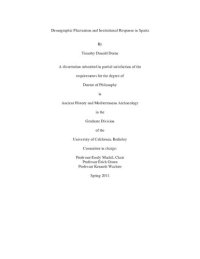
Ebook: Demographic Fluctuation and Institutional Response in Sparta
Author: Doran Timothy
- Genre: History
- Tags: History Sparta Demography Ancient History Peloponnesian War Tyrtaeus Antalkidas Classical Studies
- Year: 2011
- Publisher: PhD Dissertation
- City: Berkeley
- Language: English
- pdf
The Spartiate population declined from 8000 in the early fifth century to less than 1000 in the mid-fourth, and caused Sparta's political fortunes to drop dramatically from being the unofficial hegemon of the Greek-speaking peoples to a strictly local power in the Hellenistic period. This was the most dramatic population change of any ancient Greek city aside from cases of andrapodismos, and it drew the attention of contemporaries to the process such as Aristotle and Xenophon. Some modern scholars have seen this phenomenon primarily as a personnel loss due to families being demoted from the Spartiate rank or to deliberate elite fertility restriction due to estate preservation. But these explanations neglect the peculiarities of Spartiate reproductive customs maladaptive to demographic recovery. This dissertation first examines what made the Spartiate population regime unique, how it succeeded at first, and why and how it failed to produce a sufficient number of Spartiates to continue Sparta's hegemony. Second, it argues that Sparta's imperial phase was a response to and a result of this attested decline in Spartiate numbers and the attendant addition of non-Spartiates to the Lakedaimonian army. Finally, it examines why efforts at retrenchment in the Hellenistic period failed.
Download the book Demographic Fluctuation and Institutional Response in Sparta for free or read online
Continue reading on any device:

Last viewed books
Related books
{related-news}
Comments (0)